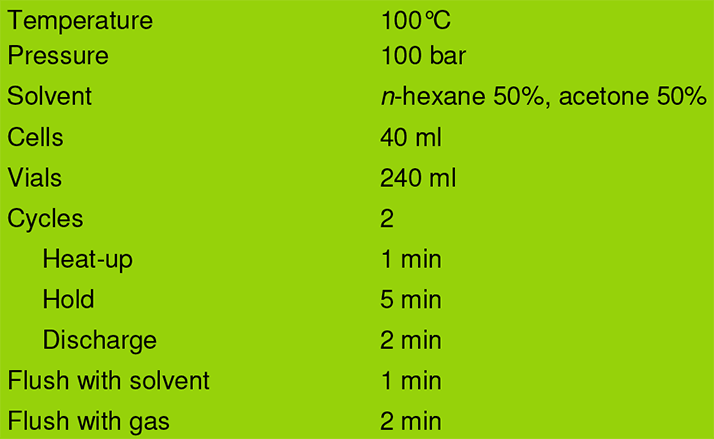Introduction
Total petroleum hydrocarbons (TPH) are a family of several hundred chemical compounds made from crude oil. TPH are found in soils and water. Exposure to TPH can affect human health and, therefore many laboratories around the world are analyzing TPH levels in the environment. This application note describes the extraction of TPH from soil, sediment, and waste samples using the SpeedExtractor E-916. The determination of TPH was done by GC-FID. The results show that the SpeedExtractor delivered reliable results with good recoveries. The extraction used 70 ml of solvent per replicate and required only 30 min.

TPH is the general term used to describe a family of several hundred chemical compounds that are made from crude oil. TPH are released from industry, commercial, or personal use. They are found in soil and water. Exposure to TPH such as gasoline or diesel fuel can affect human health. Therefore, TPH levels are monitored globally. This application note describes the extraction of TPH from soil, sediment, and waste samples using the SpeedExtractor E-916. The determination of TPH was performed by GC-FID. This application meets the requirements of the U.S. EPA Method 3545A and the ISO 16703 and EN 14039 Standards [1,2].
Experimental
Instrumentation: SpeedExtractor E-916 with 40 ml cells Samples: Pre-extracted soil sample, three certified reference materials (CRM): clay loam, sediment, and contaminated waste material (Figure 1).
 Figure 1: Pre-extracted soil (1), clay loam (2), sediment (3), and waste material (4) samples
Figure 1: Pre-extracted soil (1), clay loam (2), sediment (3), and waste material (4) samplesApprox. 10 g of sample was mixed with diatomaceous earth and filled into the extraction cell. Sample 1 was spiked with standard diesel. The samples were extracted fivefold according to the parameters described in Table 1.
 Table 1: Extraction method of the SpeedExtractor E-916
Table 1: Extraction method of the SpeedExtractor E-916The extracts were washed with water and dried over sodium sulphate. Then approx. 8 ml of each extract was cleaned up on a column filled with florisil and sodium sulfate. Quantification of TPH was performed by GC-FID.





